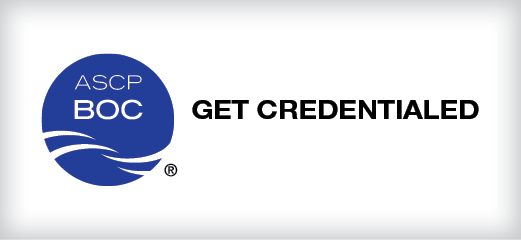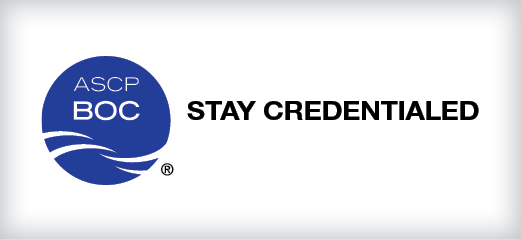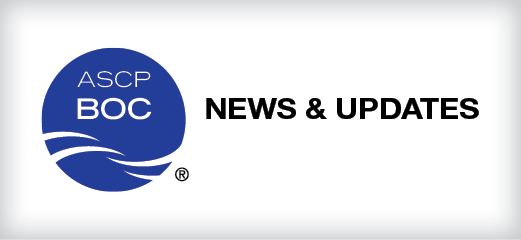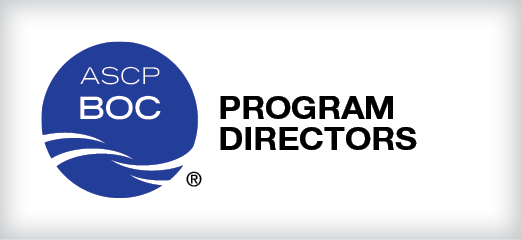BOC Mission
The mission of the ASCP Board of Certification (BOC) is to provide excellence in certification of laboratory professionals on behalf of patients worldwide.
BOC Vision
The vision of the ASCP Board of Certification (BOC) is to be the gold standard in global certification for all laboratory professionals.
BOC Values and Commitments
Competence - We seek to ensure public safety by providing a competent medical/clinical laboratory workforce.
Excellence - We strive to be the gold standard in credentialing services throughout the world.
Respect - We collaborate with our colleagues in many laboratory professions and value their diversity.
Trust - We expect our Board, committees, staff members and certificants to be honest and forthright in all processes, decisions, and actions.
Integrity - We comply with the best practices for credentialing organizations by meeting or exceeding industry standards.
Stewardship - We are dedicated to maintaining the security of the information entrusted to us and judiciously using our resources.
To fulfill the mission of the BOC, we are committed to:
Practice Analyses - Perform practice analyses every five years.
Exam Questions - Annually review questions for relevancy and validity.
Exam Database - Update the database of questions with new content to allow for industry/technology changes.
Exam Committees - Engage content experts who represent a broad spectrum of experience and geographical areas.
ANAB - Maintain ANAB accreditation.
Exam - Publish an exam from updated exam database within five years.
ANAB Accreditation
The ANSI (American National Standards Institute) National Accreditation Board (ANAB) awards accreditation to personnel certification agencies that meet the International ISO Standard 17024. The ASCP Board of Certification is the only medical laboratory certification agency awarded accreditation by ANAB.
History of the BOC
Learn about the history of the BOC.
90th Anniversary of the BOC
The ASCP Board of Certification celebrated their 90th anniversary in 2018 – 2019. Watch this video to see how the BOC has evolved and grown over the years, and see below for some highlights.
90th anniversary Video
Brief Overview of the ASCP Board of Certification
The Early Years: Recognition of Laboratory Technicians through ASCP
First Certifications, Machine Grading, and Career Recruitment (1930 – 1962)
New Certificates, Administrative Independence, and CAT (1963 – 1993)
Name Change, CMP, and International Expansion (1994 – 2018)
ASCP Board of Certification: A Guiding Light in Laboratory Medicine for 90 Years
More About the BOC
The Board of Certification (BOC) maintains a corporate relationship with ASCP for fiscal and operational purposes, but the BOC has autonomy in all governance and credentialing-related activities. The BOC manages conflict of interest and ensures impartiality by representative membership on its Board of Governors from other associations and societies. Please see Governance for more complete information.
The BOC is not a membership organization and successful credential maintenance (recertification) by the BOC does not grant or require membership in any professional organization. The Board of Certification does not discriminate as to age, gender, race, religion, national origin, disability, marital status, or sexual orientation.
BOC Professional Partners
The BOC brings together perspectives and expertise of laboratory professionals from many different organizations, institutions and geographic locations to address the certification needs of practitioners at all levels of practice.
The BOC understands the importance of impartiality in conducting certification and qualification activities. It manages conflict of interest and ensures objectivity by representative membership on its Board of Governors (BOG) from other associations and societies.
The BOC BOG is composed of representatives from many laboratory professional organizations including the three sponsoring organizations (AGT, ASCLS, and ASCP), six participating organizations (AABB, AAPA, ASC, ASM, and NSH), two collaborating partners (AACC and ASH) and one public member. The BOC BOG and its committees are composed primarily of laboratory professionals and truly represent the laboratory community.
Sponsoring Organizations
- American Society for Clinical Pathology (ASCP)
- American Society for Clinical Laboratory Science (ASCLS)
- Association of Genetic Technologists (AGT)
Participating Societies
- Association for the Advancement of Blood & Biotherapies (AABB)
- American Association of Pathologists' Assistants (AAPA)
- American Society for Microbiology (ASM)
- American Society of Cytopathology (ASC)
- National Society for Histotechnology (NSH)
Collaborating Societies
Other Related Groups
Accreditation Agencies
National Accrediting Agency for Clinical Laboratory Sciences (NAACLS)
NAACLS is a recognized agency for accreditation of the following programs:
- Medical Laboratory Scientist
- Medical Laboratory Technician
- Histotechnician/Histotechnologist
- Cytogenetics
- Diagnostic Molecular Science (Technologist in Molecular Biology)
- Pathologists’ Assistant
NAACLS also offers an approval process for the following programs:
- Phlebotomy
- Clinical Assistant (can sit for the Medical Laboratory Assistant exam)
Commission on Accreditation of Allied Health Education Programs (CAAHEP)
CAAHEP is the recognized agency for accreditation of the following programs:
- Cytotechnologist
- Specialist in Blood Banking
Accrediting Bureau of Health Education Schools (ABHES)
ABHES is a recognized agency for accreditation of the following program:
- Medical Laboratory Technician
The Role of the BOC
The BOC certifies individuals and does not accredit or approve education programs. This function belongs to specific accreditation agencies that evaluate clinical laboratory education programs.
The BOC does not accredit laboratories. This function belongs to agencies such as AABB, College of American Pathologists (CAP) or the Joint Commission.
The ASCP BOC team handles a significant number of documents, including transcripts, every day. All submitted documents and transcripts are processed in the order they are received. You can expect that all electronically submitted transcripts will be downloaded within 10 business days. However, please note that it may take up to 30 business days after receipt for all documents, including transcripts, to be reviewed and processed.
To avoid confusion and delays, please refrain from submitting duplicate documents or reaching out via email until this time has passed.
Contact the BOC
If you have questions regarding the application process or credential maintenance, please call ASCP BOC Customer Relations. Please note that the Customer Relations team does not have access to information regarding the status of submitted documents, including transcripts.
U.S.: (888) 705-5677
International/Local: (312) 767-8852
Email: bocinfo@ascp.org
Click here to view orders, print invoices, and receipts.
Mailing Address
ASCP Board of Certification
33 West Monroe Street, Suite 1600
Chicago, IL 60603
ASCP Board of Certification Appeals Process
The Board of Certification has developed an appeals process to allow individuals to appeal in the following categories.
Categories of Appeals
- BOC policy establishes the criteria for examination eligibility. These criteria are included in the Procedure for Examination and Certification booklet and on the web site. The staff determines which individuals do not meet the requirements and these individuals are notified of their deficiencies.
- The individual may respond to the notification in writing and request that his/her case be reviewed by the Certification Appeals Committee.
- None of the members of the Certification Appeals Committee shall be a member of the Examination Committee that established the eligibility requirements. A conflict of interest statement will be signed by the members.
- The appellant will be notified of the Certification Appeals Committee’s decision by the Executive Director of the BOC. If it is unfavorable, the appellant may appeal the Committee’s decision and request a hearing before the Board of Governors (BOG) Appeals Committee at the BOG’s next regularly scheduled meeting. The appellant may choose to waive his/her right to a hearing and appeal the Certification Appeals Committee’s decision directly to the BOG Appeals Committee in writing.
- The BOG Appeals Committee will review the appeal and the Committee’s decision is final.
- Individuals who wish to contest what they perceive as examination content irregularities may file an appeal to the appropriate Examination Committee.
- The Examination Committee will review the appeal at its next scheduled meeting.
- The appellant will be notified of the Examination Committee's decision by the Executive Director of the BOC. If it is unfavorable, the appellant may appeal the Committee's decision and request a hearing before the Board of Governors Appeals Committee at the time of the Board of Governors’ next regularly scheduled meeting. The appellant may choose to waive his/her right to a hearing and appeal the Examination Committee's decision directly to the Board of Governors Appeals Committee in writing.
- The BOG Appeals Committee will review the appeal and the Committee’s decision is final.
- Individuals who wish to contest what they perceive as irregularities in the administration of the examination at the testing site may appeal to the Executive Committee of the Board of Governors.
- The Executive Committee will review the appeal.
- The appellant will be notified of the Executive Committee's decision by the Executive Director of the BOC. If it is unfavorable, the appellant may appeal the Committee's decision to the Board of Governors Appeals Committee at the time of the Board of Governors next regularly scheduled meeting. The appellant may choose to waive his/her right to a hearing and appeal the Executive Committee's decision directly to the Board of Governors Appeals Committee in writing.
- The BOG Appeals committee will review the appeal and the Committee’s decision is final.
- BOC policy establishes the requirements for completion of CMP. These requirements are included in the CMP booklet and are located on the web site. The staff audits a percentage of certificants and determines those individuals who do not meet the requirements. These individuals are notified of their deficiencies.
- The individual may respond to the notification in writing and request that his/her case be reviewed by the Certification Appeals Committee.
- None of the members shall be a member of the Credentials Maintenance Committee that established the requirements. A conflict of interest statement will be signed by the members.
- The appellant will be notified of the Certification Appeals Committee’s decision by the Executive Director of the BOC. If it is unfavorable, the appellant may appeal the Committee’s decision and request a hearing before the BOG Appeals Committee at the BOG’s next regularly scheduled meeting. The appellant may choose to waive his/her right to a hearing and appeal the Certification Appeals Committee’s decision directly to the BOG Appeals Committee in writing.
- The BOG Appeals Committee will review the appeal and the committee’s decision is final.
If you wish to file a formal complaint to the ASCP Board of Certification, please follow these steps:
- Submit your complaint in writing by email including a detailed description of the complaint, your full name and contact information, customer ID number (if applicable) and any supporting documentation regarding your complaint.
- Complaints should be directed to: Formal-Complaint.boc@ascp.org
- Your formal complaint will be acknowledged upon receipt and further information may be requested.
- Upon completion of a detailed investigation, you will be notified of the final resolution of your complaint within 30 business days after the date all requested information has been received.
Potential Fraudulent Activity
In the event the Board of Certification receives evidence that an individual has committed a fraudulent activity as described in the following categories, the individual will be notified and further action will be taken as described below.
Review the Guidelines for Ethical Behavior for more information.
Categories of Fraudulent Activity
- The BOC office will inform the applicant of allegations of material misrepresentation on the application as well as all pertinent evidence.
- The individual may respond to these allegations, in writing, within thirty days following notification by the Executive Director of the BOC.
- The Board of Governors (BOG) Ethics Review Committee will review the allegations and the individual’s response and determine the appropriate course of action (including, but not limited to, invalidation of test scores, denial of admission to take additional Board exams, revocation of existing certification status, etc.)
- The individual will be notified of the BOG Ethics Review Committee’s decision by the Executive Director of the BOC. If it is unfavorable, the individual may appeal the Committee’s decision and request a hearing before the BOG Appeals Committee at the time of the BOGs next regularly scheduled meeting. The individual may choose to waive his/her right to a hearing and appeal the BOG Ethics Review Committee’s decision directly to the BOG Appeals Committee in writing.
- The BOG Appeals committee will review the appeal and the BOG Appeals Committee’s decision is final.
- The BOC will inform the individual of allegations of inappropriate conduct during the examination (including, but not limited to, giving or obtaining unauthorized information or aid) as well as pertinent evidence.
- The individual may respond to these allegations, in writing, within thirty days following notification by the Executive Director of the BOC.
- The Board of Governors (BOG) Ethics Review Committee will review the allegations and the individual's response and determine the appropriate course of action (including but not limited to invalidation of test scores, denial of admission to take additional Board exams, revocation of existing certification status, etc.).
- The individual will be notified of the BOG Ethics Review Committee's decision by the Executive Director of the BOC. If it is unfavorable, the appellant may appeal the Committee's decision and request a hearing before the BOG Appeals Committee at the time of the BOGs next regularly scheduled meeting. The appellant may choose to waive his/her right to a hearing and appeal the Executive Committee's decision directly to the BOG Appeals Committee in writing.
- The BOG Appeals Committee will review the appeal and the Committee’s decision is final.
- The BOC will inform the individual of allegations of misrepresentation or misuse of his/her certification status including pertinent evidence.
- The individual may respond to these allegations, in writing, within thirty days following notification by the Executive Director of the BOC.
- The Board of Governors (BOG) Ethics Review Committee will review the charges and the individual's response and determine the appropriate course of action (including, but not limited to, revocation of existing certification status and denial of admission to take additional Board exams, etc.).
- The individual will be notified of the BOG Ethics Review Committee's decision by the Executive Director of the BOC. If it is unfavorable, the appellant may appeal the Committee's decision and request a hearing before the BOG Appeals Committee at the time of the BOGs next regularly scheduled meeting. The appellant may choose to waive his/her right to a hearing and appeal the BOG Ethics Review Committee's decision directly to the BOG Appeals Committee in writing.
- The BOG Appeals Committee will review the appeal and the BOG Appeals Committee’s decision is final.
- The BOC will inform the individual of the notification received regarding the conviction.
- The individual may respond to this notification, in writing, within thirty days following notification by the Executive Director of the BOC.
- The BOG Ethics Review Committee will review the charges and the individual’s response, and determine the appropriate course of action (including, but not limited to, revocation of existing certification status and denial of admission to take additional Board exams, etc.).
- The individual will be notified of the BOG Ethics Review Committee’s decision by the Executive Director of the BOC. If it is unfavorable, the appellant may appeal the Committee’s decision and request a hearing before the BOG Appeals Committee at the time of the BOGs next regularly scheduled meeting. The appellant may choose to waive his/her right to a hearing and appeal the BOG Ethics Review Committee’s decision directly to the BOG Appeals Committee in writing.
- The BOG Appeals Committee will review the appeal and the committee’s decision is final.
Below are annual examination statistics for the ASCP credentials.
Examination Statistics 2024
Examination Statistics 2023
Examination Statistics 2022
Examination Statistics 2021
Examination Statistics 2020
Examination Statistics 2019
Examination Statistics 2018
Examination Statistics 2017
Examination Statistics 2016
Examination Statistics 2015
Examination Statistics 2014
Examination Statistics 2013
Examination Statistics 2012
Examination Statistics 2011
Examination Statistics 2010
Examination Statistics 2009
Examination Statistics 2008
Examination Statistics 2007
Below are the current practice analysis reports.
BB and SBB Practice Analysis Report
C and SC Practice Analysis Report
CG Practice Analysis Report
CT and SCT Practice Analysis Report
DLM Practice Analysis Report
DMLI Practice Analysis Report
H and SH Practice Analysis Report
HT and HTL Practice Analysis Report
MB Practice Analysis Report
M and SM Practice Analysis Report
MLT and MLS Practice Analysis Report
PA Practice Analysis Report
PBT Practice Analysis Report
Below are annual examination statistics for the ASCPi credentials.
International Examination Statistics 2024
International Examination Statistics 2023
International Examination Statistics 2022
International Examination Statistics 2021
International Examination Statistics 2020
International Examination Statistics 2019
International Examination Statistics 2018
International Examination Statistics 2017
International Examination Statistics 2016
International Examination Statistics 2015
International Examination Statistics 2014
International Examination Statistics 2013
International Examination Statistics 2012
International Examination Statistics 2011
International Examination Statistics 2010
International Examination Statistics 2009
Below are annual statistics for the ASCP BOC qualification examinations.
Qualification Examination Statistics 2024
Qualification Examination Statistics 2023
Qualification Examination Statistics 2022
Qualification Examination Statistics 2006 - 2021
BOC Newsletters
The BOC Newsletter is published three times a year and contains important information regarding U.S. and International certification activities including eligibility requirement changes, information on credential maintenance, and updates from the Board of Governors.
Fall 2025 Newsletter
Spring 2025 Newsletter
Fall 2024 Newsletter
Summer 2024 Newsletter
Winter 2024 Newsletter
Fall 2023 Newsletter
Spring 2023 Newsletter
Winter 2023 Newsletter
Fall 2022 Newsletter
Spring 2022 Newsletter
December 2021 Newsletter
July 2021 Newsletter
March 2021 Newsletter
eLinks
This electronic publication keeps Program Directors and educators current on BOC activities that affect programs and students.
Transition of Existing Medical Technologist MT(ASCP) Credential To Medical Laboratory Scientist MLS(ASCP)
The ASCP Board of Certification (BOC) Board of Governors (BOG) created a Nomenclature Taskforce in November of 2021 to make recommendations for gaining acceptance and adoption of a unified title of Medical Laboratory Scientist (MLS).
This group was formed after the ASCP BOC and American Society for Clinical Laboratory Science (ASCLS) published the position paper Standardizing the Professional Title of Medical Laboratory Professionals: A Position Paper of American Society for Clinical Laboratory Science (ASCLS) and the American Society for Clinical Pathology Board of Certification (ASCP BOC).
The Nomenclature Taskforce and the BOC BOG agreed that one goal critical to standardization is to transition the BOC credentials, Medical Technologist, MT(ASCP)/MT(ASCPi) to Medical Laboratory Scientist, MLS(ASCP)/MLS(ASCPi).
This means that anyone with an MT(ASCP) or MT(ASCPi) credential will be transitioned to MLS(ASCP) or MLS(ASCPi) by the end of 2022. These credentials are equivalent.
When will my MT(ASCP) credential transition to MLS(ASCP)?
You may begin using the MLS(ASCP) or MLS(ASCPi) credential immediately. However, formal verification of your ASCP certification will continue to show MT(ASCP) or MT(ASCPi) certification until the transition process is completed.
When will the process be completed?
The process is expected to be completed by the end of 2022.
Will I be sent a new wall certificate that indicates MLS(ASCP)?
No, new wall certificates will not be sent. If, after the credential transition, you wish to order a new certificate, you may do so after the transition is complete. https://www.ascp.org/content/board-of-certification/Verify-Credentials/#replace_wallcert
Will I be required to do CMP?
No, CMP will continue to be voluntary for those ASCP certified prior to 2004.
Transition of Existing Molecular Pathology MP(ASCP) credential to Molecular Biology MB(ASCP)
The Technologist in Molecular Pathology, MP(ASCP) credential will be transitioned to Technologist in Molecular Biology, MB(ASCP) by the end of 2022. These credentials are equivalent.
Cytologist/Cytology Adopted as New Certifying Terminology
In October 2021, the ASCP BOG voted to approve the renaming of the CT/SCT credential titles. Cytotechnologist has been changed to “Cytologist” and Specialist in Cytotechnology has been changed to “Specialist in Cytology”.
In addition the International Technologist in Gynecologic Cytology credential title, has been renamed “International Gynecologic Cytologist.”
This transition was finalized in early 2022 and is a title change only, the requirements for CT/SCT/CTgyn certification/recertification and credentials remain the same.
BOC Distinguished Service Award
The DSA is presented to volunteers who have served the BOC for a minimum of six years and made significant contributions involving extra time and effort toward the BOC mission to provide excellence in certification of laboratory professionals on behalf of patients worldwide.
2022 DSA Recipients
- Laura Bilodeau, MD, FASCP was recognized for her service on the Board of Governors from 2012–2021.
- Kathleen Finnegan, MS, MLS(ASCP)SHCM was recognized for her service on the Board of Governors from 2012–2021.
2021 DSA Recipients
- Amy Groszbach, MEd, MLT(ASCP)MBCM was recognized for her service on the Board of Governors from 2011–2020.
- Susan Harrington, PhD, D(ABMM), MLS(ASCP)CM was recognized for her service on the Board of Governors from 2010–2020. She served as the Chair of the BOG from 2017–2019.
- Lena Spencer, HTL(ASCP)QIHCCM was posthumously recognized for her service on the Board of Governors from 2011–2020.
- Terry Taff, MA, MLS(ASCP)SMCM was recognized for her service on the Microbiology Examination Committee from 2013–2020.
2020 DSA Recipients
- Patty Eschliman, MHA, MLS(ASCP)CMDLMCM
- Lee Hilborne, MD, MPH, FASCP, DLM(ASCP)CM
2019 DSA Recipients
- Scott E. Aikey, MLS(ASCP)CMDLMCM
- Susan Beck, PhD, MLS(ASCP)CM
- Helen Bixenman, MBA/HCM, CHC, CG(ASCP)CMDLMCM,QLCCM
- Kathleen Hansen, MLS(ASCP)CM
- Sui Zee, MD, FASCP
BOC Board of Governors Service Award
The BOC Board of Governors Service Award is given to volunteers that have made noteworthy contributions during their tenure as a committee or Board member.
2022 BOGSA Recipients
- Michael Berry, SCT(ASCP)CMMBCM was recognized for his service on the Cytology Examination Committee from 2014–2021.
- Malinda Browning, MPH, MLS(ASCP)CM was recognized for her service on the Hematology Examination Committee from 2014–2021.
- Ann Crowley, MB(ASCP)CM was recognized for her service on the Molecular Biology Examination Committee from 2013–2021.
- Susan Higgins, MS, MLS(ASCP)SC was recognized for her service on the Medical Laboratory Assistant Examination Committee from 2014–2021.
- Stacey Robinson, MS, MLS(ASCP)CMSHCM,SCYMCM was recognized for her service on the Hematology Examination Committee from 2014–2021.
2021 BOGSA Recipient
Deanna Iverson, MHS, MLT(ASCP)SCTCM HTL was recognized for her service on the Board of Governors from 2009 – 2020.
2020 BOGSA Recipients
- Michael Bowling, MLS(ASCP)CMSHCM
- David Chhieng, MD, FASCP
- Ericka Hendrix, PhD, MB(ASCP)CM
- Michelle Nelsen, MS, HTL(ASCP)CM
- Liz Sharratt, PA(ASCP)CM
2019 BOGSA Recipients
- Denise Anamani, MA, I(ASCP)MBCM
- Virginia Reyes, MEd, MLS(ASCP)SBBCM
- Lori Schmitt, HT(ASCP)QIHCCM
- Jason Yuhas, CG(ASCP)CM
One Name for the Profession
It is said that the laboratory profession is suffering from an identity crisis. Very few people have knowledge about the education and training required to be a laboratory professional. The BOC is committed to creating an awareness of the profession and to tackle issues related to professional nomenclature, beginning with Medical Laboratory Scientist (MLS).
What’s in a name?
Everything important to our profession -- professional identity, as well as recognition from the healthcare team, administration, government agencies, and the public. The lack of understanding affects recruitment and retention in the profession. It is time we move to one name -- Medical Laboratory Scientist.
Join the BOC and our professional partners’ by taking the pledge!
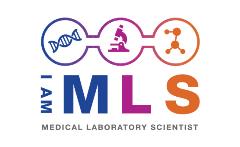
Additional nomenclature resources
- Job Description templates for MLT or MLS (March 2024): Medical Laboratory Job Titles and Descriptions for the 21st Century
- Critical Values article (January 2023): Unification of Nomenclature
- ASCP BOC Nomenclature Task Force paper (September 2022): Promoting the Medical Laboratory Science Profession through Standardized Titles
- Frequently Asked Questions (FAQs): Promoting the Medical Laboratory Science Profession through Standardized Titles FAQ
- Original position paper (December 2020): Standardizing the Professional Title of Medical Laboratory Professionals A Position Paper of American Society for Clinical Laboratory Science (ASCLS) and the American Society for Clinical Pathology Board of Certification (ASCP BOC)
Right click to save image to save to your computer.
Images cannot be altered.
 . jpeg
. jpeg


